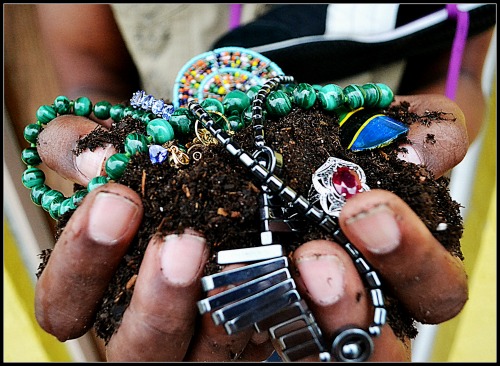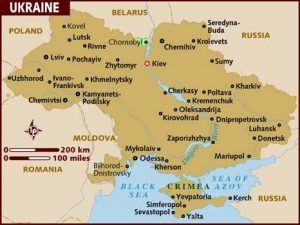
by Jill | May 7, 2014 | 2014, Africa, Bilingual, Multicultural, Philanthropy, World Moms Blog, World Motherhood

Bilingual people are lucky. Not just in all of the usual brain-expanding ways, but because they have options.
Sometimes, English just doesn’t cut it, and I wish I could effortlessly sort through my mental rolodex for a more helpful way to express myself. Code-switching, or flipping back and forth between languages in a single sentence or conversation, is something common to bilingual people, big and small.
My bilingual four-year-old just did it about five times in the last two minutes:
These are my favorite chausseurs.
I can danse très bien avec these.
Mon ami à l’école doesn’t like them.
Je veux…ummm…I want le marqueur to make le dessin!
You don’t even have to be truly bilingual to reap the benefits. Jacomine, from Multilingual Living, gives this example: “When I talk with an [Arabic speaker] in the Netherlands, we might both use Dutch and I might sometimes use some Arabic words in order to identify myself as a person who knows some Arabic, even though my Arabic is very poor. Code-switching is a powerful tool for identification.”
That’s more my style, because while I wish I was a “balanced bilingual,” it will never be so. I can function in French and Spanish, but I think and dream in English. Unfortunately, I’m stereotypically American in my relative monolingualism. However, after three years in Congo, there are several French phrases I appreciate for their descriptive power. I will share three of them, but with the disclaimer that I may have invented my own understandings in the midst of my adult-language-learner’s fog. I also acquired all of my French in Africa, not France. Apologies, and please feel free to laugh.
#1: On est là.
This phrase sort-of-literally means “we are here.” I hear it a lot around Kinshasa, usually from people who want you to be extra aware of their presence and help. I like it because it feels more subtle than “at your service,” but still demands a certain degree of recognition. It seems like a way to point out that you are offering time, skills or attention that deserves appreciation. I’ve been thinking about this a lot after reading The Confidence Gap last week. Women of the world: on est la!
#2: Ça va un peu.
Sometimes you just aren’t okay, and it’s fine to say so. I say, “Ça va?”, about fifty times a day. The conversation often goes like this:
Jill: Ça va?
Other person: Ça va un peu… (“I’m a little okay…”)
Jill: Ohh? Pourquoi?
Other person: (long story about worries, illness or other trouble)
When I ask someone if they are okay in English, the response 99% of the time is, “I’m fine”. In French, although I sometimes I dread the explanation, I believe in the opportunity to truly express yourself. I find that I’ve been embracing emotional honesty more often au français.
#3: Bon courage!
This is an important one. I can’t think of a way to tell someone in English with equal sincerity and brevity to “take heart,” “be brave,” and “have godspeed” all at the same time. This simple phrase gets the job done neatly and concisely. People have said bon courage to me at some of my most tender moments; when my child was hospitalized, when I was facing a tough decision or when I felt tired and sad. Somehow, the phrase bon courage never seems trite.
I always think it would be the perfect thing to say to a woman in labor – somehow expressing, “You can do this, but you have to do it yourself. No one can help you, but you will be okay. Have courage.” All that in just two perfect words.
Some things just sound better in French.
What do you think? Can you think of any phrases in languages other than English that use less words to express so much more?
This is an original post written for World Moms Blog by Jill Humphrey. You can find Jill blogging with Sarah Sensamaust at Mama Congo.
Photo credits to the author.

by Olga Mecking | Apr 21, 2014 | 2014, Awareness, Being Thankful, Bilingual, Communication, Family, Health, Humanity, Humor, Kids, Language, Life Balance, Maternal Health, Motherhood, Netherlands, Parenting, Siblings, World Motherhood, Younger Children
 One of my very favourite human qualities is a sense of humour. I must confess that I sometimes find people lacking this wonderful quality, as boring. It isn’t nice of course but I believe a sense of humour is paramount to any human’s well being or even survival. Especially if you’re a mom.
One of my very favourite human qualities is a sense of humour. I must confess that I sometimes find people lacking this wonderful quality, as boring. It isn’t nice of course but I believe a sense of humour is paramount to any human’s well being or even survival. Especially if you’re a mom.
I love all kinds of humour: simple, sophisticated, absurd, or even black humour. By the latter, I mean of course, serious matters that are funny.
When my days are filled with screams and cries and tantrums, the only thing that keeps me afloat is laughing about it. And when I share my pearls of wisdom on Facebook, not only does it make me feel better, it makes others feel better, too. I also love reading snarky, funny, honest posts that make me nod my head in agreement. When times are hard, humour helps me survive.
We all know that parenting is tough and humour can help with that as well. I, for one, rely heavily on it. When my daughter refuses to put on her jacket, I ask her to put on her pj’s. Then her bathing suit. Then her bathrobe. She laughs, says no to all I suggest and puts on her jacket without any problems. That is, obviously provided that I actually remember to laugh instead of to yell.
I often try to persuade my big girl that I have 10 legs. She kindly and patiently explains that no I really can’t have 10 legs. “Why?” I ask her. She tries to explain that humans only have 2 legs but to no avail. I really need to know why I only have 2 legs, not 10. I mean, 2 legs, how lame is that! At some point, she cracks up and so do I and we both laugh until we can’t laugh anymore.
So you see, it is not very surprising that I want my children to have a sense of humour and a big one at that. Puns, laughter and jokes are normal in our house. And already, I begin seeing it in my children. For instance, I loved a recent conversation with my three-year old.
“Mama?”- she asks me, with a glint in her eye, and a smile playing in the corner of her mouth.
“Yes, J?”- I answer, wondering what she’s going to say.
“Mama?”- she repeats, her tone still serious but the smile more visible.
“Yes, J?”- I repeat, not sure what to think of it.
“Pee-Pah-Paw!” she says, out of nowhere, her laughter filling the house. “Pee-pah-paw”- I say, and soon the whole family joins her till our bellies hurt.
My baby has a mischievous smile that makes my heart melt. When he laughs, I think I’m the luckiest mom on Earth. I ‘m sure that he too will grow up to have a sense of humour, just like his sisters.
I especially love when they make multilingual jokes, like “Ja-vocado” and “Nie-vocado” (“ja” is “yes” in German while “nie” means “no” in Polish). When asked what a ja-vocado is, my eldest daughter said that it’s a fruit that is yellow on the outside and pink on the inside and it is sweet and very delicious and that she likes it a lot.Funny that she can imagine liking fruit that doesn’t even exist.
I am always surprised how many functions humour can have: it can help you through tough times. It can turn a rejection into cooperation, in children and adults alike. It makes children clever and great with languages. It makes us see things in a different way.This is why I feel it is so important.
I’m not funny all the time, though and that’s fine. It’s OK to be sad sometimes. I won’t pretend that my day is better than it is. But when I remember, I find in myself the strength to stick my tongue out at the universe and say: “Pee-Pah-Paw”. And laugh until my belly hurts.
Are you raising your kids to have a sense of humour or appreciate humour?
This is an original post to World Moms Blog from our writer in the Netherlands, Olga Mecking.
The image used in this post is credited to cherijoyful. It holds a Flickr Creative Commons attribution license.
Olga is a Polish woman living in the Netherlands with her German husband. She is a multilingual expat mom to three trilingual children (even though, theoretically, only one is trilingual since she's old enough to speak). She loves being an expat, exploring new cultures, learning languages, cooking and raising her children. Occasionally, Olga gives trainings in intercultural communication and works as a translator. Otherwise, you can find her sharing her experiences on her blog, The European Mama. Also take a while to visit her Facebook page .
More Posts - Website
Follow Me:




by ThinkSayBe | Mar 28, 2014 | 2014, Africa, Communication, Cultural Differences, Culture, Economy, International, Language, Life Lesson, Poverty, Travel, Vacationing, World Motherhood
 “Hey bro, vipi? How much for these shoes?” I ask the second-hand market vendor.
“Hey bro, vipi? How much for these shoes?” I ask the second-hand market vendor.
“Ah! Those, for you, those are $30 U.S.dollars,” he responds with a tone indicating that he’s giving me a deal. He didn’t know I was Tanzanian, maybe because I hadn’t yet spoken more than a few words in Kiswahili. Words that any foreigner who cared to find out would have known.
“$30?! I can get a new pair of shoes in the U.S. for that amount!” I say in return, flabbergasted by the price this man just gave me.
After a few minutes of haggling, going back and forth about the quality of the shoes, and his realization of my nationality, we do not close the sale of these shoes, but commence having a very important conversation about the poverty of Africa.
I will call this man Peter, as I do not recall his name.
As I talked down the price of the shoes, Peter said things like, “You people have money!” and “Come on, you can pay this amount easily.”
When Peter and I started talking (immediately after I decided not to purchase the shoes), I asked him his reasons behind hiking prices up so high for foreigners. He simply said, “Because we are poor here in Tanzania, and in Africa, so I have to try to earn money some way, and you guests have the money.” (more…)
I am a mom amongst some other titles life has fortunately given me. I love photography & the reward of someone being really happy about a photo I took of her/him. I work, I study, I try to pay attention to life. I like writing. I don't understand many things...especially why humans treat each other & other living & inanimate things so vilely sometimes. I like to be an idealist, but when most fails, I do my best to not be a pessimist: Life itself is entirely too beautiful, amazing & inspiring to forget that it is!
More Posts
Follow Me:


by Kyla P'an (Portugal) | Mar 24, 2014 | 2014, Awareness, Being Thankful, Childhood, Education, Eye on Culture, Family, Feminism, Inspirational, Language, Life Lesson, Parenting, Preschool, Relationships, USA, Womanhood, Women's Rights, World Mom Feature, World Moms Blog, World Motherhood, Younger Children
 From almost the moment our daughter came onto the scene eight years ago, we knew she had a strong personality. She was one of those incredibly alert and determined babies; the type you could tell was processing her surroundings and trying to figure out what to do about them.
From almost the moment our daughter came onto the scene eight years ago, we knew she had a strong personality. She was one of those incredibly alert and determined babies; the type you could tell was processing her surroundings and trying to figure out what to do about them.
While many babies and toddlers her age were delighted to be pushed in a swing, my daughter would have nothing to do with swings until she was old enough to figure out what made them go. She had no desire to be the passive recipient of being pushed, instead she wanted to be in control; she wanted to conquer it. She took the same approach with toys, puzzles and games. She was an early walker, a determined eater, and an all-around intense little thing.
My husband and I frequently got comments like: “boy, you’ve got your hands full with that one,” or “she’s going to keep you on your toes.”
As our daughter grew, by far her favorite activities involved sorting, organizing and problem solving. I have one vivid memory of her toddler music class, when she was just two years old. About three-quarters of the way through the class, the teacher put out a basket of instruments for the children to choose from and play along with. Our daughter, who was particularly fond of the little plastic eggs filled with beans—which she called shake-a’s—was determined to collect as many of them as possible. Driven by this singular motive, she went around the room delivering alternate instruments to fellow toddlers and parents alike. Anytime she encountered an individual who already had a shake-a, she’d attempt to persuade them with an alternate instrument in exchange until she had gathered a significant cache.
During these displays of self-assured behavior and go-get-‘em spirit, I often found myself shrinking into the background, hoping other parents wouldn’t fault me for having such a pushy, precocious child. At this particular music class, however, a parent approached me afterwards and commended me for having such a “strong child with clear leadership potential.” With her few words of encouragement, this parent liberated me from my deep mommy guilt about having a child with drive.
I was in constant conflict because, even though I am a child of the 70’s—a time when many of our mothers here in the US were breaking down stereotypes and entering the workforce en masse—I was raised by my father, who came from an old-world upbringing and had old-fashioned views of how boys and girls should behave.
I am reluctant to admit that, rather than celebrating my daughter’s inherent leadership qualities, I labeled her as “bossy” and occasionally even criticized her for being too demonstrative.
Bossy, a word inferring that someone is behaving “boss-like,” should be a compliment heralding someone’s leadership skills but ironically, instead it criticizes her for it. It’s a label reserved primarily for girls. You rarely hear it applied to boys. A little girl on the playground, organizing kids into teams and assigning them roles will quickly be knocked down a few rungs by calling her “bossy,” whereas a little boy taking the same actions might be respected and followed.
I’m ashamed to admit, even I supported this stereotype. I was concerned my daughter was too confident interacting with adults, leading activities and organizing groups. I was concerned she wasn’t “girly” enough, lacked empathy and a gentle, nurturing-side. As a modern, liberated and independent woman myself, I still didn’t want her peers to ostracize her or put her down.
Why was I struggling between nurturing and diminishing my daughter’s inner boss? Why was I uncomfortable with her being a leader, or overly-confident or intensely goal oriented? What could I do to help raise this new generation of girl-leaders?
Two weeks ago I got some reassuring answers. They were in the Wall Street Journal, on a full-page, front-of-section article titled, “Don’t Call Us Bossy.” And the women giving the encouragement were the Chief Operating Officer of Facebook, Sheryl Sandberg, and the Chief Executive Officer of Girl Scouts, USA, Anna Maria Chavez.
Sandberg and Chavez’s goal is to redirect our thinking about the way girls lead. To relabel our vocabulary about girls’ take-charge behavior. Instead of bossy behavior, recognize it as executive leadership potential, like CBS television anchor, Norah O’Donnell does. Instead of discouraging ambitious goals, support girls to recognize their inherent ability to achieve whatever goal they set out for.
I think the world would be a very different—and frankly far more pleasant—place to live in if there were more “bossy” women in charge.
Let’s take a stand to have more female bosses in the workplace; Here’s to raising our girls to be the leaders they are capable of being, not the followers our lexicon makes them feel they are supposed to be!
Did anyone ever call you “bossy” growing up? Do you see these qualities in your own child? How do you feel about assertive and confident girls?
For ways to encourage leadership in girls, visit LeanIn.org and BanBossy two of the movements supported by Sheryl Sandberg, Ana Maria Chavez and Girl Scouts, USA.
This is an original post to World Moms Blog from our managing editor and mother of two, Kyla P’an.
The image used in this post is credited to Pat Moore. It holds a Flickr Creative Commons attribution license.
Kyla was born in suburban Philadelphia but spent most of her time growing up in New England. She took her first big, solo-trip at age 14, when she traveled to visit a friend on a small Greek island. Since then, travels have included: three months on the European rails, three years studying and working in Japan, and nine months taking the slow route back from Japan to the US when she was done. In addition to her work as Managing Editor of World Moms Network, Kyla is a freelance writer, copy editor, recovering triathlete and occasional blogger. Until recently, she and her husband resided outside of Boston, Massachusetts, where they were raising two spunky kids, two frisky cats, a snail, a fish and a snake. They now live outside of Lisbon, Portugal with two spunky teens and three frisky cats. You can read more about Kyla’s outlook on the world and parenting on her personal blogs, Growing Muses And Muses Where We Go
More Posts - Website
Follow Me:


by World Moms Blog | Mar 10, 2014 | 2014, Awareness, Bilingual, Communication, Cultural Differences, Culture, Elections, Eye on Culture, Guest Post, Human Rights, Humanity, International, Language, Life Lesson, Living Abroad, Media, Multicultural, Politics, Tragedy, USA, World Events, World Interviews, World Motherhood, World Tour, World Voice
Today, we have a special guest post by a Ukranian mother living in the United States, Olena Centeno, of Bilingual Kids Rock. Olena opens the window and lends us her personal perspective to the current events in Ukraine…

Protest in Kiev, November 2013
What’s it like growing up in Ukraine?
As a Ukrainian, I grew up speaking two languages: Russian and Ukrainian. I ate Ukrainian borsht for lunch and Russian pelmeni for dinner. I love Tchaikovsky’s Sleeping Beauty and Carols of the Bells by Leontovych. I am raising my own children trilingual in English, Russian and Ukrainian. In fact, the two cultures (Russian and Ukranian) are considered so close, that if an Ukrainian abroad says s/he is from Ukraine people often say “Oh, so you are from Russia?”
What’s going on between Russia and Ukraine?
With Russian troops moving across the sea into Ukraine’s Crimean peninsula, a lot of Westerners are starting to ask this question.
The current conflict in Ukraine is more than three months old. It began with a peaceful demonstration on November 21 at Independence Square (Maidan) in Kiev, the capital of Ukraine, when the (now ousted) Ukrainian president (Yanukovich) hesitated to sign an Association Agreement with the EU. This had been one of his major election promises and in breaking it he ignored the desire of millions of Ukrainians.
During the past three months, the “EuroMaidan” demonstration has grown into a much bigger movement. It started as a response to the failed EU deal but then truly turned into a movement against the corrupt government of president Yanukovich, who moved to keep Ukraine in long-lasting and very painful economical ties with Russia.
Then, after the government passed harsh, anti-assembly laws, it became about the basic human right to be able speak and think freely without being punished for it.
More than a hundred lives were lost and thousands injured during violent attempts to remove the demonstrators but people did not leave the cold streets of Kiev. More freedom fighters came from all over Ukraine to support them. Many other Ukrainian cities stood up as well. After three months of struggle, Mr. Yanukovich was impeached and left Ukraine (he refused to sign a resignation; he just ran away). His presidency was considered illegitimate and a new, temporary government was elected.
As Ukrainians were mourning over lives lost and looking into the future with great hope to build their country on principles of trust and freedom, a new enemy emerged: Informational War.
Along with Russia, Eastern Ukraine—where the majority is Russian speaking—is dominated by Russian-language news from the Russian media. Unfortunately, the Russian media coverage of events that have happened over the past three months is falsified [and full of propaganda].
Now, after the armed occupation of Ukrainian territory in Crimea by Russian troops, the reason for their untruthful reporting is understood: Creating social opinion in Russia and Russian-speaking Ukraine justifies military intervention into Ukrainian territories.
Personally, I think Mr. Putin has an imperialistic plan to be the most powerful ruler in modern history—politically and financially—and he will stop at nothing to add Ukraine to his control.

Russian Media Propaganda Uncovered
The following are all lies that have been spread by the Russian media leading up to the invasion of Ukraine by Russian troops:
1. FALSE: Kiev was Overrun by Violent Riots
Despite violent clashes, most of Kiev stayed peaceful throughout the demonstrations. The day-to-day lives of residents were largely unaffected outside of Independence Square and the areas immediately surrounding it. Very little of Kiev or the surrounding countryside was damaged or disturbed by the protests.
I know this because I called my family and friends every day. My nephews were going to school as usual, most of the people attended work on a daily basis, and all shopping malls and grocery stores were working (except for a few in the middle of the protest areas downtown).
2. FALSE: Anti-Russia Fascists Led the Ukrainian Protests
The vast majority of protesters were ordinary citizens tired of a government that they viewed as corrupt and unwilling to listen to the people. There were no fascist elements leading the demonstrations, and there are none leading the new government.
Many of the people I know personally were in Maidan: teachers, IT professionals, doctors, stay-at-home moms, businessmen, university professors, hair stylists and many others. People I worked with and went to school with. And no one will ever convince me that they are fascists. My daughter’s god-father is a surgeon and worked days and nights protecting the health and saving the lives of many.
3. FALSE: The New Government Will Force All Ukrainians to Speak Ukrainian
This is a particularly effective myth for Russian-language media, since it appeals directly to the people who would be most affected. Language has long been a contentious issue in Ukraine. Claims that Russian will be abolished are being used to generate anger against the new government.
The Ukrainian parliament voted to repeal a 2012 law allowing the establishment of minority languages as official state languages in individual provinces on February 23, 2014 but acting President Oleksandr Turchynov vetoed the move. Russian is currently recognized as an official language, is legal for state use in several Ukrainian provinces, and is guaranteed state protection “in all spheres of public life” in Crimea specifically.
I speak Russian and Ukrainian to my children here in the USA. I see language first and foremost as a tool for communication — and shame on any politicians who use it as a reason for war.
4. FALSE: Ukrainian Demonstrators Have Been Attacking Russians or Russian-Speakers
Another unproven and untrue claim widely circulated in Russian-language media is that the Euromaidan protesters were deliberately attacking Russian speakers.
The cruel result is that ordinary Russians – good, wholehearted, educated people – are now eager to help a Ukraine that they think is swamped by fascists! I have family in eastern Ukraine and my god-mother lives in Moscow. They have called multiple times, scared for the lives of my parents in Kiev. They really think Ukraine is in danger.
There is no evidence to support the claim, and nearly all cases of violence during the protest were perpetrated against civilians by security forces. The Euromaidan protests had very little to do with cultural or language issues in general.
While Yanukovych’s perceived obedience to the Russian government was certainly a source of anger in Ukraine, this anger was directed at the President and the actions of the Russian and Ukrainian governments, not to the Russian people or culture.
5. FALSE: The Berkut and Other Security Forces Fought in Self-Defense
Russian news broadcasts have shown extensive footage of the Berkut and other riot police under attack but nearly none of their attacks on civilians. The reality is that security forces attempted to crush peaceful protests with deadly force, and were barely driven back with improvised weapons like clubs and Molotov cocktails. The superior force and aggression were always on the side of the Berkut.
6. FALSE: The Independence Square/Euromaidan Protests Were Organized by Americans
We joke that EuroMaidan is now supported by Americans because my American husband and I made donations to help supply people with warm clothing and blankets during cold winter months.
I am not claiming that on a political level there is no lobbying of interests from outside countries and unions but once again: the politics of the country and the people of the country are two different things.
The vast majority of protesters were native Ukrainians and ordinary residents of Kiev and the surrounding country.
7. FALSE: Fascism Will Spread from Ukraine to Russia
This is another falsehood dependent on the idea that the Euromaidan demonstrators were fascist extremists. It is being used as a justification for Russian invasion. The Russian government claims it is defending Russian-speakers in Ukraine and its own borders from Ukrainian fascists but in reality those fascists do not exist.
What is next?
The military intervention is not over. It is hard to say what is going to happen next. There is a lot of talk going on at a very high, political level involving the EU and the US.
But Ukrainians have already had the biggest win in this struggle: themselves.
They proved to themselves that they care:
- They care about all of our people (amazing examples of collaboration happened during the civil unrest!);
- they care about the future of their country;
- they care about their freedom;
- they care enough to recognize the differences among themselves and to stay united anyway.
The revolution was heartbreaking and tearful but as a result, Ukrainians became true patriotic citizens of their country:
Glory to Ukraine, Glory to Heroes!
слава Україні, слава героїв
(slava Ukrayini, slava heroyiv)
For me, personally, it has been a life lesson in how to raise my own children. I have a clear goal to raise multicultural and multilingual children, who respect other languages and cultures and can see our shared humanity no matter how politicians try to divide us.
This is an original guest post to World Moms Blog by Olena Centeno.
 Olena Centeno is a Ukrainian who lives in USA, a happy mom of three wonderful kids ages 2-9 and a wife to the great. She speaks three languages herself and is raising her kids to be multilingual in English, Russian, Ukrainian and Spanish. She founded Bilingual Kids Rock, where she helps families on their bilingual journey. She also enjoys photography and video making as a way to preserve precious moments of life.
Olena Centeno is a Ukrainian who lives in USA, a happy mom of three wonderful kids ages 2-9 and a wife to the great. She speaks three languages herself and is raising her kids to be multilingual in English, Russian, Ukrainian and Spanish. She founded Bilingual Kids Rock, where she helps families on their bilingual journey. She also enjoys photography and video making as a way to preserve precious moments of life.
You can connect with her at Bilingual Kids Rock.
Photo credit to Oxlaey. This photo has a creative commons attribution license.
World Moms Blog is an award winning website which writes from over 30 countries on the topics of motherhood, culture, human rights and social good. Over 70 international contributors share their stories from around the globe, bonded by the common thread of motherhood and wanting a better world for their children.
World Moms Blog was listed by Forbes Woman as one of the "Best 100 Websites for Women 2012 & 2013" and also called a "must read" by the NY Times Motherlode in 2013. Our Senior Editor in India, Purnima Ramakrishnan, was awarded the BlogHer International Activist Award in 2013.
More Posts

by Olga Mecking | Feb 3, 2014 | 2014, Awareness, Being Thankful, Bilingual, Culture, Education, Expat Life, Humanitarian, Inspirational, Language, Life Lesson, Living Abroad, Millennium Development Goals, Motherhood, Moving, Netherlands, Philanthropy, Shot@Life, Social Good, Stress, World Motherhood
 Until a friend of mine had a terrible tragic accident in the Himalaya mountains that left her in a coma, I had never donated to a charity. We collected some money at our wedding to give to her husband, and my mom also donated some money to a charity that takes care of her, but that was it.
Until a friend of mine had a terrible tragic accident in the Himalaya mountains that left her in a coma, I had never donated to a charity. We collected some money at our wedding to give to her husband, and my mom also donated some money to a charity that takes care of her, but that was it.
Since moving to another country and having children, I have been looking for ways to help others. I want to donate to more charities. I am just looking for the right one.
It isn’t easy. I have heard of many charities that have turned out to be scams or which just took people’s money and ran.
My situation is especially difficult because I live in a foreign country and do not know about the charities here. Though my Dutch is fluent, I still have trouble communicating in this language sometimes. In the Netherlands, many people go house-to-house collecting money for charities.
I think it is interesting to find out about charities that way because they’re often ones I’ve never heard of before. They are often small scale actions rather than big ones. But I think the mistake they’re making is the following one: before I contribute, I’d like to find out more about the organization, whether my friends have heard of it, whether there is something about them that raises red flags.
I think I might even agree to donate money if they were willing to leave a business card or something I could find them by. Instead, they want me to make a monthly commitment. Again, because I do not know them, I am not so keen on giving them my credit card number.
At the same time, my heart breaks for all the little children going through invasive treatments; who are terminally ill; who look like little ghosts because they have lost so much weight from all their chemo; for all the sick people who can’t get the treatment they need; or for children who are not so fortunate as mine; or moms in poorer countries, who have to travel for many days if they want to give birth in a hospital.
I really want to help. Since I became a mom and later a World Moms Blog contributor, I have been made aware of needs and dreams that can’t be fulfilled because of the bad conditions all around the world.
But the fact is that finding the right charity isn’t easy. I mostly say no to these door-to-door people. I do it with a heavy heart. I just want to make sure that I am really helping people in need, and not wasting my money.
Luckily, while looking for a charity to donate to, there is a lot I can do:
- In my circle of friends alone, there have been situations where help was needed, including domestic violence and pregnancy problems.
- I am considering taking the Shot@Life pledge and becoming a Champion.
- I can learn as much as I can about actions such as #MDG’s and participate in our Twitter Parties.
- I can find local communities, organizations, charities and brands.
- Many of my friends are absolutely talented people and use their talents to collect money for a good cause, and I can help them spread the word and participate.
I know this sounds like nothing, and I am not telling this to show off how good of a person I am. It is just to show that even though it sounds like nothing, we all can make a difference. I am still very new at this social good cause. I still have a lot to learn. Already I have asked my fellow World Moms Blog contributors for help choosing a charity I can actually trust and they have come up with great charities.
I need to do more. I want to do more. I will do more.
Do you have a charity or cause worth supporting? Tell us about it and help spread the word
This is an original post to World Moms Blog from Olga Mecking in The Netherlands.
The image used in this post is credited to Images Money. It holds a Flickr Creative Commons attribution license.
Olga is a Polish woman living in the Netherlands with her German husband. She is a multilingual expat mom to three trilingual children (even though, theoretically, only one is trilingual since she's old enough to speak). She loves being an expat, exploring new cultures, learning languages, cooking and raising her children. Occasionally, Olga gives trainings in intercultural communication and works as a translator. Otherwise, you can find her sharing her experiences on her blog, The European Mama. Also take a while to visit her Facebook page .
More Posts - Website
Follow Me:












 “Hey bro, vipi? How much for these shoes?” I ask the second-hand market vendor.
“Hey bro, vipi? How much for these shoes?” I ask the second-hand market vendor.









